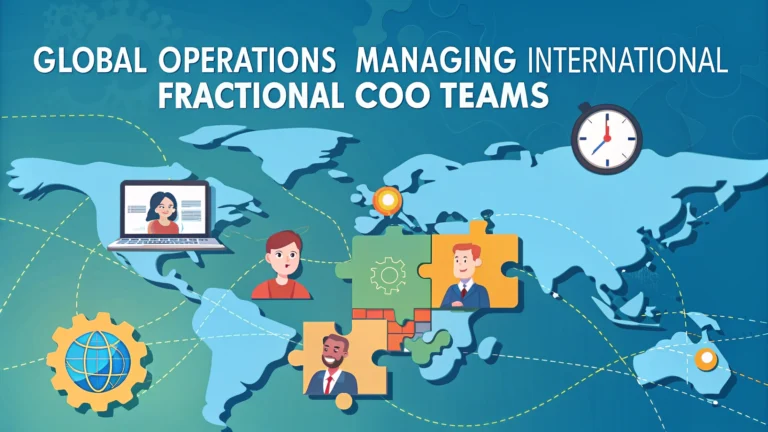Managing international fractional COO teams requires a unique blend of leadership skills, cultural awareness, and operational expertise.
Organizations increasingly rely on fractional executives to provide specialized leadership while maintaining cost efficiency and accessing global talent pools.
This guide explores proven strategies for effectively coordinating distributed fractional COO teams across different time zones, cultures, and business environments.
Setting Up Your International Fractional COO Structure
A well-designed organizational structure forms the foundation for successful international fractional COO management.
- Define clear roles and responsibilities for each team member
- Establish reporting hierarchies and communication protocols
- Create standardized operating procedures across regions
- Implement performance metrics and KPIs
Time Zone Management Strategies
Effective time zone coordination ensures smooth operations across global teams.
- Use time zone overlap windows for key meetings
- Rotate meeting times to share the burden of odd hours
- Document all decisions and updates in shared platforms
- Set clear expectations for response times
Communication Tools and Technology
The right tech stack enables seamless collaboration across borders.
- Project Management: Asana, Monday.com, or Trello
- Communication: Slack, Microsoft Teams
- Video Conferencing: Zoom, Google Meet
- Document Sharing: Google Workspace, Microsoft 365
Cultural Intelligence and Team Dynamics
Success in global operations depends on cultural awareness and adaptability.
- Research and respect local business customs
- Adapt communication styles for different cultures
- Consider local holidays and work schedules
- Create inclusive team-building activities
Performance Monitoring and Accountability
Remote team effectiveness requires clear metrics and regular assessment.
| Metric Category | Key Indicators |
|---|---|
| Operational Efficiency | Project completion rates, response times |
| Team Collaboration | Meeting attendance, communication frequency |
| Business Impact | ROI, cost savings, process improvements |
Legal and Compliance Considerations
International operations must navigate various regulatory environments.
- Ensure proper contractor agreements are in place
- Comply with local labor laws and regulations
- Address intellectual property protection
- Maintain data privacy standards (GDPR, CCPA)
Next Steps for Success
Building an effective international fractional COO team requires ongoing commitment to improvement and adaptation.
Contact professional organizations like COO Alliance or CEO Direct for additional resources and networking opportunities.
Regular assessment and adjustment of your management approach will ensure continued success in global operations.
Budget Management and Cost Control
Financial oversight becomes more complex with international fractional teams.
- Establish clear billing and payment processes
- Account for currency exchange fluctuations
- Monitor ROI across different regional operations
- Implement cost control measures and reporting
Crisis Management Protocol
Distributed teams need robust emergency response procedures.
- Create regional contingency plans
- Establish emergency communication channels
- Define escalation procedures
- Maintain backup leadership chains
Knowledge Management Systems
Effective information sharing is crucial for fractional team success.
- Develop centralized documentation repositories
- Implement version control systems
- Create standardized onboarding materials
- Maintain updated process libraries
Scaling and Growth Strategies
Plan for team expansion and evolving operational needs.
- Identify triggers for team expansion
- Create scalable processes and systems
- Develop talent pipeline strategies
- Plan for regional market expansion
Maximizing Global Operational Excellence
Success in managing international fractional COO teams depends on continuous adaptation and improvement of management practices. Organizations must balance local autonomy with global consistency while maintaining clear communication channels and performance standards.
Regular evaluation of team structure, processes, and outcomes ensures sustained operational excellence across all regions. By implementing these strategies and maintaining focus on cultural intelligence and technological enablement, organizations can build high-performing international fractional COO teams that drive business success.
- Schedule quarterly strategy reviews
- Conduct annual team structure assessments
- Update procedures based on lessons learned
- Invest in ongoing team development
FAQs
- What exactly is a fractional COO team in a global context?
A fractional COO team consists of part-time or shared Chief Operating Officers who work across multiple time zones and geographical locations to manage international operations, providing operational expertise on a flexible basis to multiple organizations. - How do you effectively coordinate fractional COO teams across different time zones?
Coordination is achieved through dedicated collaboration tools, scheduled overlap hours, asynchronous communication protocols, and clear handoff procedures between team members in different time zones. - What are the key benefits of utilizing international fractional COO teams?
Benefits include cost efficiency, access to diverse market expertise, 24/7 operational coverage, scalability, and the ability to tap into specialized knowledge of different regional business practices and regulations. - How should compensation be structured for international fractional COO teams?
Compensation typically involves a combination of retainer fees, performance-based incentives, and market-adjusted rates based on regional cost of living and experience levels, often structured through international contractor agreements. - What technologies are essential for managing global fractional COO teams?
Essential technologies include project management software, communication platforms (like Slack or MS Teams), video conferencing tools, document sharing systems, and operational dashboard solutions that enable real-time monitoring across time zones. - How do you maintain consistency in operations across different cultural contexts?
Consistency is maintained through standardized operating procedures, regular cross-cultural training, clear documentation, and establishing universal KPIs while allowing for necessary local adaptations. - What are the main challenges in managing international fractional COO teams?
Key challenges include communication barriers, cultural differences, varying regulatory requirements, time zone coordination, maintaining team cohesion, and ensuring consistent quality across different regions. - How do you handle data security and compliance across international fractional teams?
Data security is managed through encrypted communication channels, strict access controls, compliance with international data protection regulations (like GDPR), and regular security audits across all operational locations. - What qualifications should you look for when building an international fractional COO team?
Look for professionals with international business experience, cross-cultural competency, specific regional expertise, strong remote work capabilities, and demonstrated success in fractional leadership roles. - How do you measure the success of global fractional COO teams?
Success is measured through defined KPIs, operational efficiency metrics, client satisfaction ratings, cost savings analysis, and achievement of specific regional and global business objectives.







